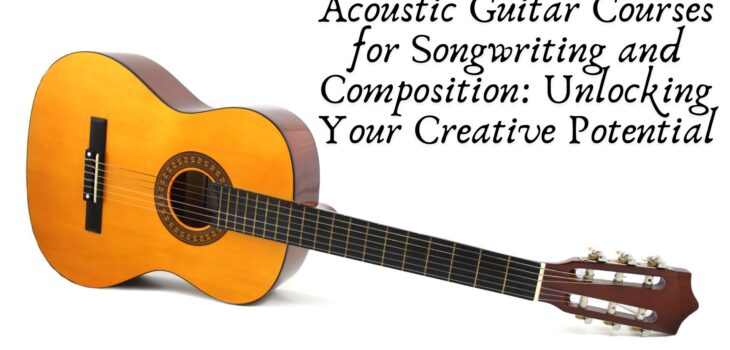 Education
Education
Acoustic Guitar Courses for Songwriting and Composition: Unlocking Your Creative Potential
In the world of music creation, the acoustic guitar holds a timeless charm. Its warm, organic sound continues to inspire musicians and songwriters across all genres. For aspiring songwriters and composers, mastering the acoustic guitar can open up a world of creativity and expression. Whether you’re an amateur strummer or a seasoned guitarist looking to refine your craft, enrolling in a specialized acoustic guitar course for songwriting and composition can elevate your musical journey in profound ways.
This article explores the benefits, content, formats, and top recommendations for acoustic guitar courses designed specifically for songwriting and composition.
Why Choose an Acoustic Guitar for Songwriting?
Before diving into the structure of guitar courses, it’s important to understand why the acoustic guitar is such a powerful tool for songwriters:
- Portability and Accessibility: Easy to carry and requires no amplification, making it ideal for spontaneous songwriting.
- Expressive Range: From soft fingerpicking to bold strumming, acoustic guitars offer dynamic sound options.
- Self-Accompaniment: Enables you to sing and play simultaneously, which is crucial for songwriting development.
- Versatility Across Genres: Folk, country, indie, pop, blues, and even stripped-down versions of rock songs come alive with acoustic arrangements.
What to Expect from an Acoustic Guitar Songwriting Course
A well-structured course typically blends guitar technique with songwriting fundamentals. Here are the core components you might encounter:
Chord Theory and Progressions
You’ll learn common chord families, voicing techniques, and how to create emotional impact through chord choices. Expect topics like:
- Major/minor chord construction
- Diatonic and modal progressions
- Circle of fifths for songwriting
Rhythm and Strumming Patterns
Rhythmic diversity adds flavor to your songs. Courses often cover:
- Standard and syncopated strumming
- Fingerpicking patterns
- Time signatures and groove creation
Melody Writing
The course may guide you in crafting compelling melodies that match your lyrics, including:
- Vocal range matching
- Note intervals and melodic hooks
- Using scales for melodic variation
Lyric Writing Techniques
Many courses incorporate lyric development as part of the composition process:
- Narrative vs. abstract songwriting
- Rhyme schemes and phrasing
- Emotional authenticity and storytelling
Song Structure and Arrangement
You’ll study how to construct verses, choruses, bridges, and pre-choruses:
- Dynamics and tension building
- Repetition and contrast
- Arranging intros, outros, and instrumental breaks
Recording and Demo Creation
Modern courses often include guidance on home recording:
- Using DAWs (Digital Audio Workstations)
- Layering guitar tracks
- Creating professional-sounding demos
Course Formats: Online vs. In-Person
Online Courses:
- Flexible and self-paced
- Accessible globally
- Video tutorials, PDFs, and community forums
- Examples: Coursera, Udemy, TrueFire, JustinGuitar, and Skillshare
In-Person Classes or Workshops:
- Real-time feedback from instructors
- Networking opportunities
- Live collaboration and jam sessions
- Often held at local music schools or community centers
Some hybrid options combine online materials with virtual live sessions for an interactive learning experience.
Recommended Acoustic Guitar Songwriting Courses
Here are some highly rated courses tailored to acoustic guitar songwriting:
“Songwriting for Guitar” by Mike Meiers
- Designed for acoustic players
- Focuses on modern songwriting techniques
- Includes feedback opportunities
“Acoustic Guitar Songwriting” on Udemy
- Teaches how to write songs from scratch
- Covers melody, lyrics, and rhythm
- Beginner-friendly with step-by-step lessons
“Guitar for Songwriters” on Berklee Online
- Offered by Berklee College of Music
- Deep dive into harmony, rhythm, and song arrangement
- Certificate available upon completion
TrueFire’s Songwriting Toolbox
- Features lessons from multiple professional songwriters
- Includes acoustic-specific modules
- Strong focus on chord creativity and emotional impact
Skillshare: “Songwriting and Composing on Guitar”
- Ideal for intermediate players
- Combines theory, creativity, and technique
- Emphasis on finding your musical voice
Benefits of Taking a Specialized Course
- Structured Learning Path: Guides your progress instead of random YouTube exploration.
- Boosts Confidence: Knowing the “why” behind chords, rhythms, and structures empowers you.
- Encourages Consistency: Regular lessons help you stay motivated and productive.
- Feedback and Growth: Many courses offer critiques from instructors or peers, helping you refine your work.
- Portfolio Building: By the end of most courses, you’ll have a few original compositions ready to perform or record.
Who Should Take These Courses?
- Beginners who want to write original music and develop basic guitar skills.
- Intermediate players seeking to improve their songwriting chops.
- Aspiring artists preparing for open mics, recording sessions, or demo submissions.
- Hobbyists looking to create meaningful songs for personal expression.
Tips for Getting the Most Out of Your Course
- Practice Regularly: Even 15–30 minutes daily can make a difference.
- Write Often: Don’t wait for inspiration—make songwriting a habit.
- Record Everything: Use your phone or DAW to capture ideas for later refinement.
- Listen Actively: Study songs by artists you admire and break down their structure.
- Collaborate and Share: Join online groups, share your songs, and seek feedback.
Final Thoughts
Acoustic guitar courses for songwriting and composition offer a gateway to creative freedom and musical self-expression. Whether you’re just starting out or looking to deepen your artistry, these courses provide the tools and guidance needed to bring your songs to life. With a blend of technical skills, theoretical knowledge, and emotional insight, you can transform your acoustic guitar into a songwriting companion for life.









